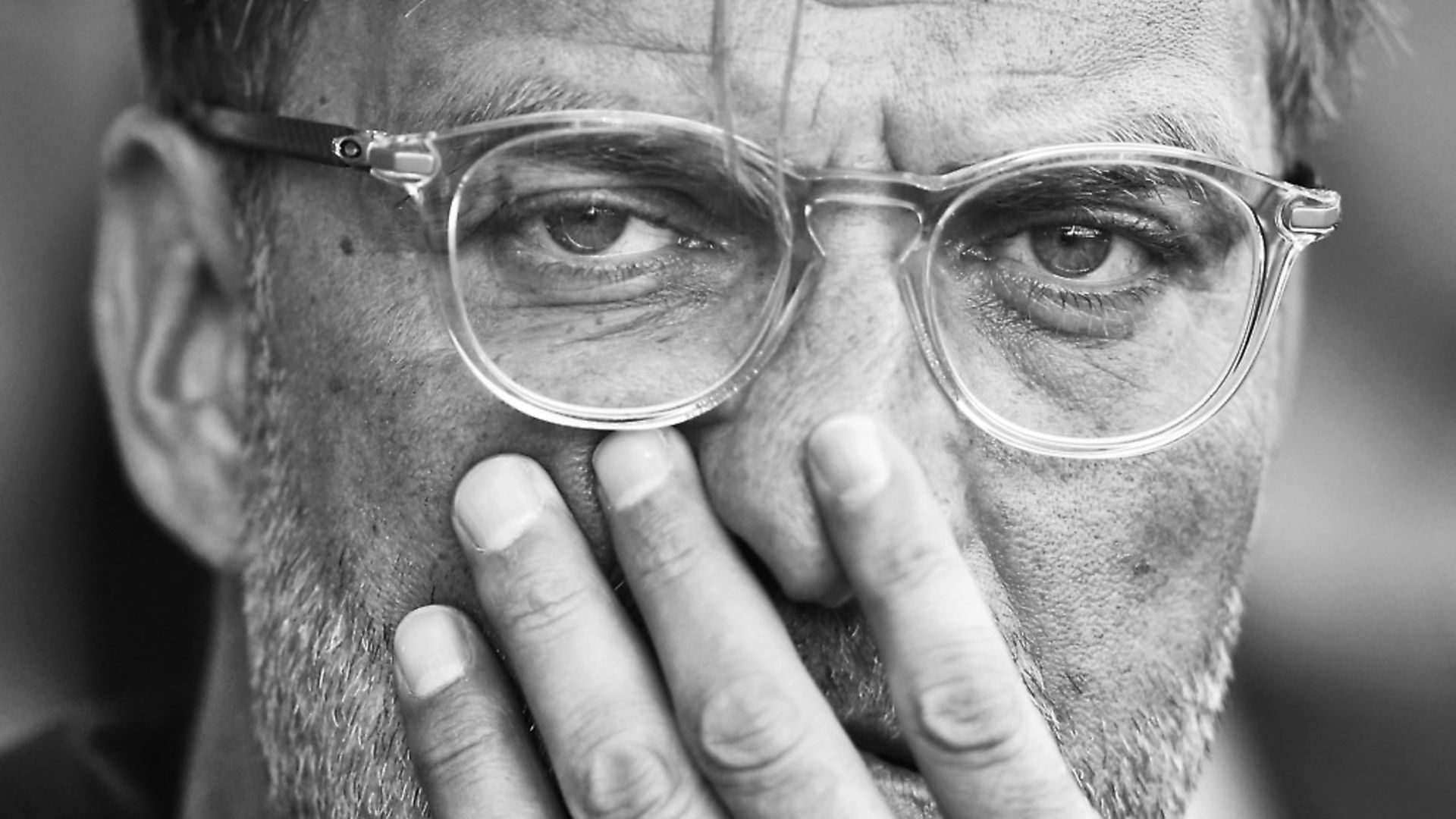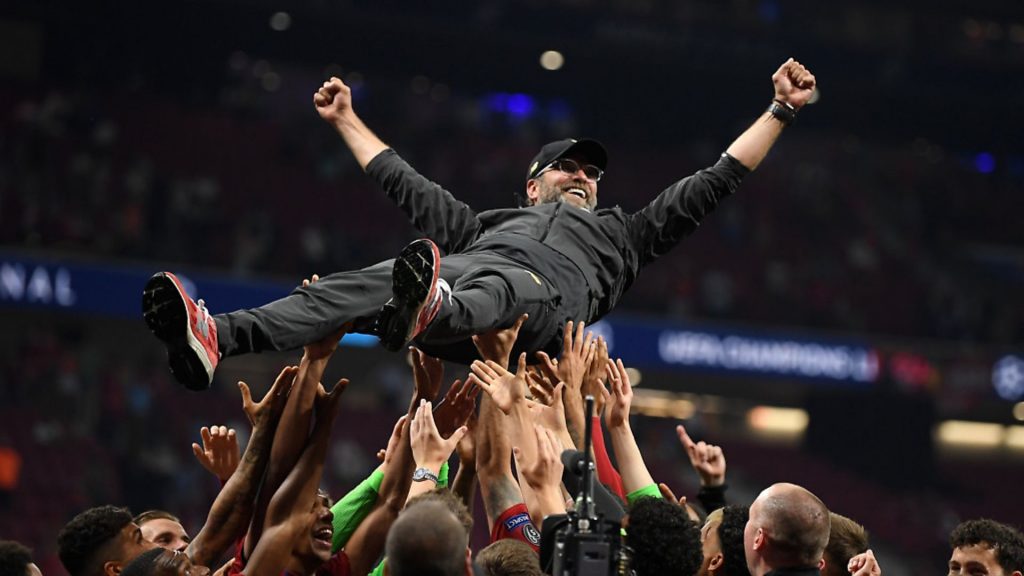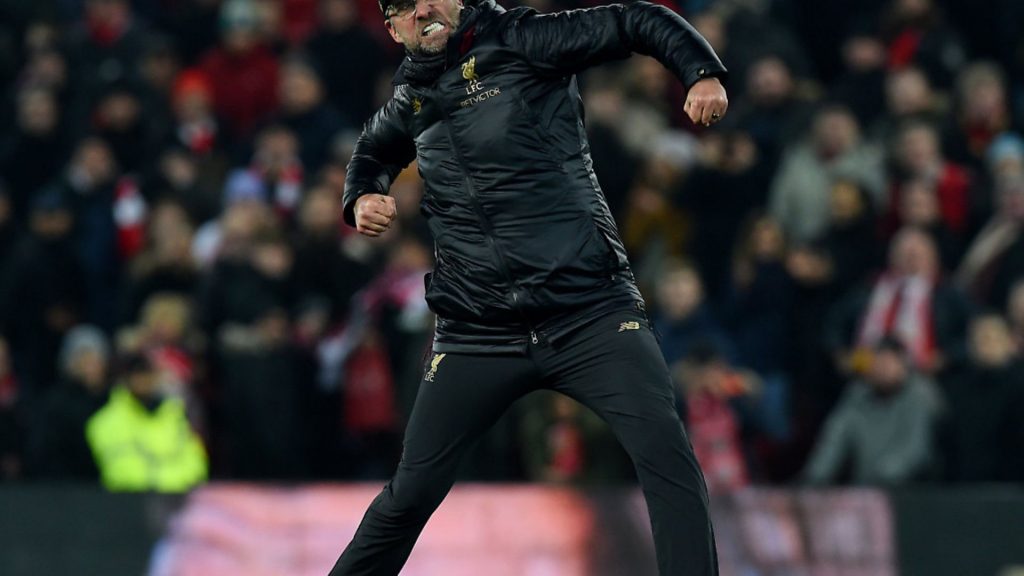
Liverpool leader Klopp said he would never go into politics, but his leadership and authenticity in the face of all odds should inspire our politicians, says ALASTAIR CAMPBELL.

Though there are occasionally some wonderful historical features on sport further into the paper, nobody would subscribe to The New European on account of the football coverage. When we do touch upon football, it is usually in a way that embraces other themes, such as social and cultural change. And, bear with me, all ye poor souls who fail to understand why for some football rivals family as the thing closest to our hearts – ‘rivals,’ I said, not ‘beats’ – I will get Brexit in here too. Brexit, the runaway title winner in the Global League of self-inflicted acts of national harm.
Even in lockdown, football was never far from the centre of the national conversation. Early in the crisis we had the debate about whether top players should take a pay cut. We wondered whether the once moderately sensible Matt Hancock was imbibing sufficient quantities of the Johnson populism drug to suggest they should? You bet he was. Would bankers, hedge funders, billionaires who sidle up to housing ministers and try to secure preferential treatment saving them millions face the same pressure? Not so much. Why go for a hard target you might actually bump into at a Tory fundraiser when you have the easy target of mainly working class young men who happen to have become very wealthy very young on account of being good at football? Manchester United’s Marcus Rashford had the best possible ‘show not tell’ response, helping to shame a heartless government into doing something that a government with a heart would have done without the need for the shame, and thereby helping ensure hungry kids get fed.
When we did get football back into our lives, it was via the Germans showing us how it was done. Then, when my own team Burnley were back in action, there was as much focus on a plane flying overhead with a ‘white lives matter Burnley’ banner than there was on the football. Burnley are lucky to have a captain as bright as Ben Mee, and a manager as savvy as Sean Dyche, and both handled the situation faultlessly in interviews. But it underlined a strange modern phenomenon – the tendency to treat politicians like celebrities and celebrities like politicians. Had this not been so, I doubt Boris Johnson or Donald Trump would ever have risen quite as high as they have. Have I Got News For You? has an important slot in the Johnson CV, his ‘he makes me laugh’ shtick a not insignificant factor in persuading those Tory MPs who knew he would be a disaster as PM nonetheless to back him.
I have never quite bought the line that footballers are role models simply because they are footballers. They can be inspirations in that they show that by working hard and having good values they can make the most of their talents and make a contribution to a greater good. In an ideal world children would be looking at their parents for that kind of role modelling.

But at the end of the day, if I may employ a football favourite, they are footballers. Why do we expect them to have the moral standards of an archbishop, the political judgement of a president, and the diplomatic sensitivities of an ambassador? The role model line is essentially an excuse to give newspapers spurious ‘public interest’ justification for stories about footballers’ off-field misconduct. The newspapers who are fondest of this approach tend to be the ones which most strongly support Boris Johnson, whose private life they have often viewed as a no-go area, even when he was up to stuff that would have been all over front page and back, had he been a famous footballer. One of the reasons Germany is viewed globally as a more serious country right now is because it does have serious political leadership. Angela Merkel gave an interview recently to a group of European journalists, including from the Guardian.
It was noteworthy for two things from my perspective. Just one question on Brexit, briefly despatched, with the observation – I paraphrase – the Brits have made their bed and they need to lie in it. Secondly, the transcript showed that the whole interview consisted of Merkel answering serious questions about a wide range of subjects in a way that was informed, informative and devoid of the platitudes and glib one liners that have come to characterise the communications of our own government.
Why, she didn’t even get down and do a press-up in front of a German flag. At government level we have a vacuum in serious political leadership. This has enormous consequences. Take the ‘common sense’ phenomenon. Doubtless in the nightly taxpayer-funded focus groups plenty of people have been complaining about the lockdown and saying the government should let people use their common sense. Everyone likes to think they have common sense. And Johnson likes to play back to people what they want to hear.
What could be more commonsensical, as the government eases the lockdown, than a day trip to the seaside? If that common sense is simultaneously shared by many thousands of others, however, then we have a problem. But when Matt Hancock says he will not hesitate to act, including by the shutting of beaches, a country tired of his presentation of a s**tshow as a success, pays little heed.
So Boris Johnson steps in and says that people should not take ‘liberties’, but even as the word leaves his lips and heads towards the ears of the nation, the thing between our ears immediately summons up an image of Dominic Cummings and so the instinct – and we remember from the Cummings saga how important instincts are – is to say ‘do one, Johnson’.
I was reading Bild Zeitung the morning after, mainly to see how the German media was covering Liverpool’s Premier League triumph. Extensively, is the answer. Jürgen Klopp was everywhere (just as he seems to be in this week’s New European – see pages 23 to 27 for our own interview with him).
The Liverpool manager is a huge figure in German life. I watched a German news bulletin the night before and in the ad break Klopp was the star of two commercials, one for a financial advisory company, the other for a beer. The Alcohol Concern ambassador in me went ‘tut tut’ but then the ad was so well done, and Klopp’s personality so strong within it, I give up mid-tut. He has so much capital left in the goodwill bank. After all, this is a man unafraid to call out Brexit for the unmitigated disaster that it is, clear he could not vote for a right-wing party, or for lower taxes, and who recently said that watching the German and UK governments’ handling of Covid has been like watching two different planets. (Ein Mann nach meinem eigenen Herz!) Also in Bild was a picture that will be familiar to all of you, of a packed Bournemouth beach. The headline: ‘Niemand hört mehr auf Boris Johnson’ – ‘Nobody listens to Boris Johnson any more’.
It’s a problem. If there is a second wave, and there does have to be a second lockdown, Johnson has the opposite problem to Klopp. He is running low in the goodwill tank, and lower still in the credibility tank. When Liverpool fans over-celebrated their team winning the Premier League, did you notice who was leading the condemnation, and the call for people to calm down? The police, the council and the football club. Government nowhere to be seen. Indeed, if Johnson had been the one calling for people to go home, the reactions of many in Liverpool, not least for historical reasons, would be to do the opposite.
Then Klopp himself wrote an open letter to the Liverpool Echo, rich in love for the city, respect for its history, admiration for his players, special mentions for Kenny Dalglish and Steven Gerrard, and then this: ‘What I did not love – and I have to say this – was the scenes that took place at the Pier Head on Friday. I am a human being and your passion is also my passion but right now the most important thing is that we do not have these kind of public gatherings. We owe it to the most vulnerable in our community, to the health workers who have given so much and whom we have applauded, and to the police and local authorities who help us as a club, not to do this. Please – celebrate – but celebrate in a safe way and in private settings, whereby we do not risk spreading this awful disease further in our community.’ Leadership. Authenticity. It shines through.
Klopp was once asked whether he would consider going into politics. He said no. His reasoning. ‘I have too much common sense.’ When he was asked about why he opposed Brexit, he said: ‘Do we want a not-perfect situation alone or a not-perfect situation as a strong partner in a very strong unit? For me it’s only common sense, because history taught us that if you’re alone you are weaker than the unit.’
He clearly likes the common sense theme as much as Johnson does. The difference is that Klopp seems to have it, and understand how it works in others. He has basic leadership skills that Johnson lacks, the ability to build a strong team, the ability to unite, the ability to inspire, the ability to be truthful, the ability to have a clear strategy and stick to it, even when forced by a pandemic to adapt, the ability to achieve great things.
I will take him at face value when he says he would never go into politics, but meanwhile feel compelled to ask, of football fans and non-fans alike: right now, today, 2020, who would you rather have in charge of a big project that had implications for your future… Boris Johnson? Or Jürgen Klopp?









